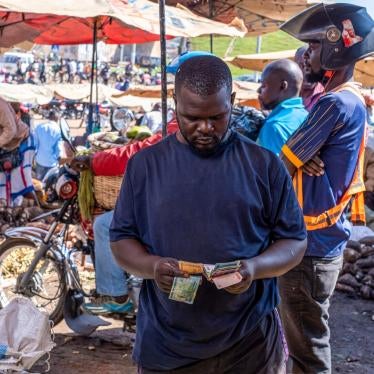As finance and development ministers and legislators gather in Morocco for the annual meetings of the World Bank and the International Monetary Fund (IMF), from Oct. 9 to 15, the pressing issue of runaway global inequality will loom large on their agenda.
Governments can use various tools to address inequality, including fair taxes, quality public services and just labor conditions. And an important tool they should consider now is universal social security, a set of policies and programs designed to ensure financial security across a person’s lifetime.
The World Bank and IMF wield substantial influence by funding and shaping social security systems globally. The World Bank is the largest global funder among international organizations. However, for the last few decades these institutions have promoted a failed approach based on austerity and lean programs. These programs temporarily target people considered the poorest and most vulnerable without putting in place the broader, long-term structures that protect everyone throughout their lives.
Under the current approach, more than 80 percent of Africans and 60 percent of people living in Arab states have no income security at all from their national social security systems, even though international law has recognized social security as a right since 1948. In a world with more wealth than ever, in which billions of people face shocks from economic and climate crises, this is a dismal policy failure.
On Oct. 3, a group of 43 human rights and economic justice organizations urged the World Bank and the IMF to radically shift their approach. They want these lending institutions to support countries in building social security systems that guarantee adequate protections for all.
One misconception driving the lending institutions’ failed approach comes from ideas about who “deserves” social protection. The truth is that life’s uncertainties can disrupt anyone’s financial stability. Anyone may lose their job or become ill.
Moreover, identifying and reaching the most at risk can be an impossible task, particularly in countries where the majority grapple with meager and precarious incomes. Take Lebanon, where the United Nations estimates that over 80 percent of the population faces poverty. In such contexts, attempts to distinguish between the poor and the non-poor inevitably leads to an error-riddled selection process, eroding trust in a system perceived as arbitrary. Systems designed to target the people deepest in poverty generally not only fall short of their intended impact, but also contribute to tensions in already polarized societies, instead of building social cohesion.
Another prevailing concern revolves around the affordability of universal systems, especially for lower and middle-income countries with substantial debt burdens. However, pathways for financing universal programs exist, even for nations with modest resources, and universal systems, well-designed and coupled with sound tax policies, can yield economic returns and higher government revenues from taxes.
Consider Nepal’s journey, which began with the introduction of a universal pension scheme in the 1990s for people ages 75 and older. By 2022, it had expanded this to those over 68. The government also introduced universal disability benefits, and in 2009 committed to a phased rollout of universal child benefits, district by district. The inclusivity of these programs has made them popular and resulted in political support.
There are many financing options to expand social security coverage and benefits. In the early 2000s, Uruguay took steps to expand coverage to workers in the informal economy. Zambia financed universal pensions through taxation on mineral and gas extraction, while Brazil introduced a temporary tax on financial transactions to expand coverage.
High-income countries such as Denmark and Finland laid the groundwork for universal systems during periods when their economies were considerably smaller and average incomes lower than in several present-day low- and middle-income countries. They financed these initiatives through measures that included progressive taxes laying the foundations for more just, inclusive, and stable societies.
While some countries have experimented with privatizing parts of their social security systems, such as state pensions, outcomes were not good according to the International Labor Organization. They found that pension coverage rates stagnated or decreased, benefit levels deteriorated, old-age poverty worsened, and gender and income inequality increased. Furthermore, privatization eroded social dialogue and generated social tensions. The majority have since reversed these privatizations.
For governments concerned about how people might use benefits, or that they could contribute to labor shortages, the evidence is reassuring: there is no evidence of such problems. On the contrary, studies from around the world have shown that social security enhances skill acquisition, boosts productivity, reduces stress, and curbs the consumption of alcohol and tobacco.
Universal social security builds trust in government because benefits are delivered on a fair and equitable basis to everyone. Greater trust in government is necessary for a new eco-social contract and an economy that delivers on rights, reduces inequality, and addresses the climate crisis. It is now the collective responsibility, and obligation, of governments, the World Bank, and the IMF to commit to and deliver on universal social security.
Lena Simet is a senior economic justice researcher at Human Rights Watch. Daisy Sibun is a social policy specialist at Development Pathways.










